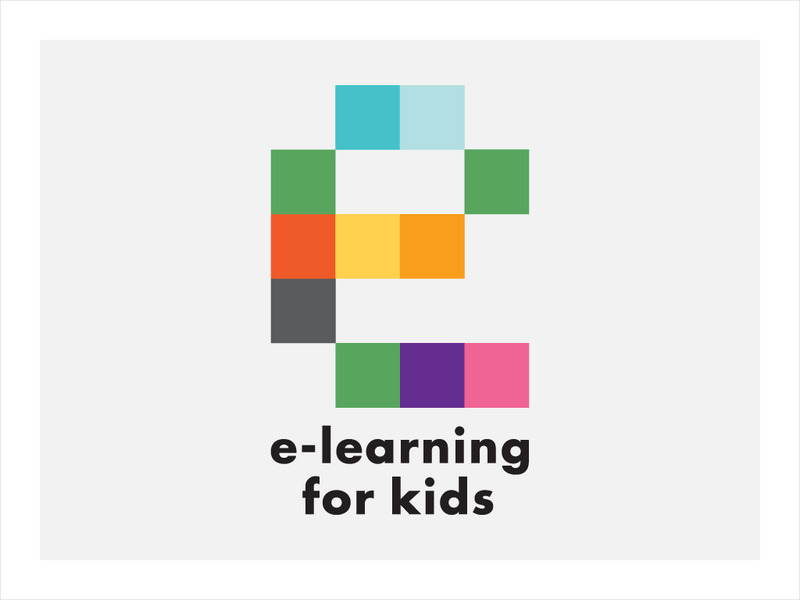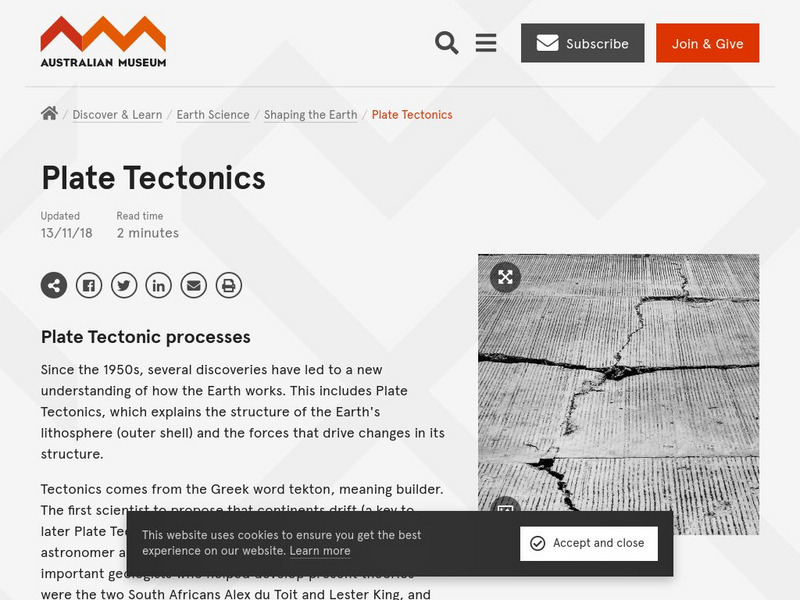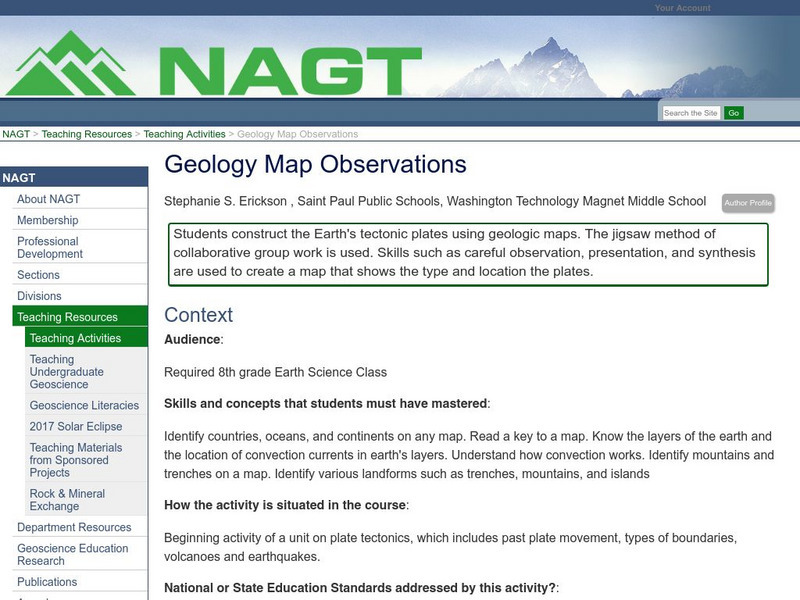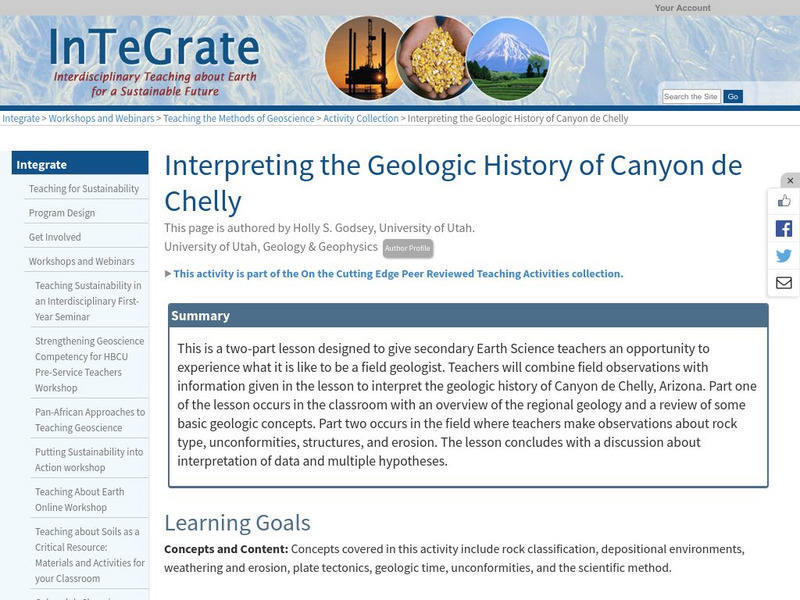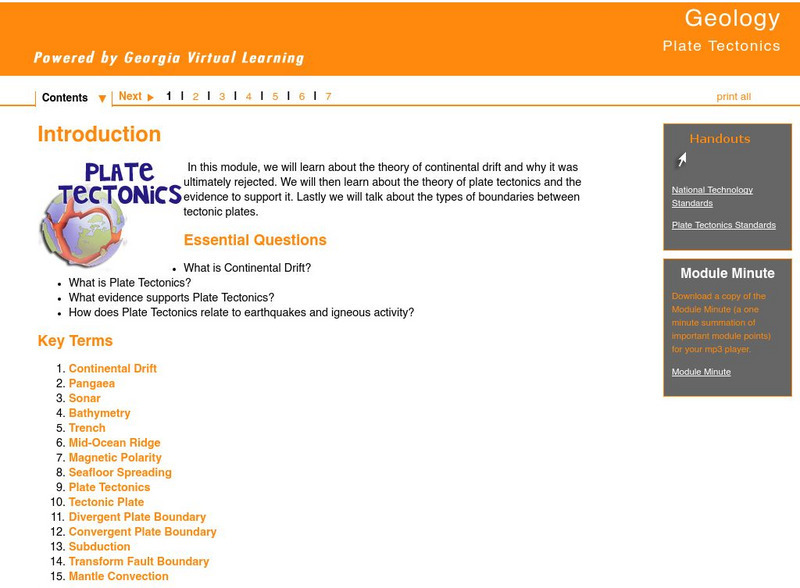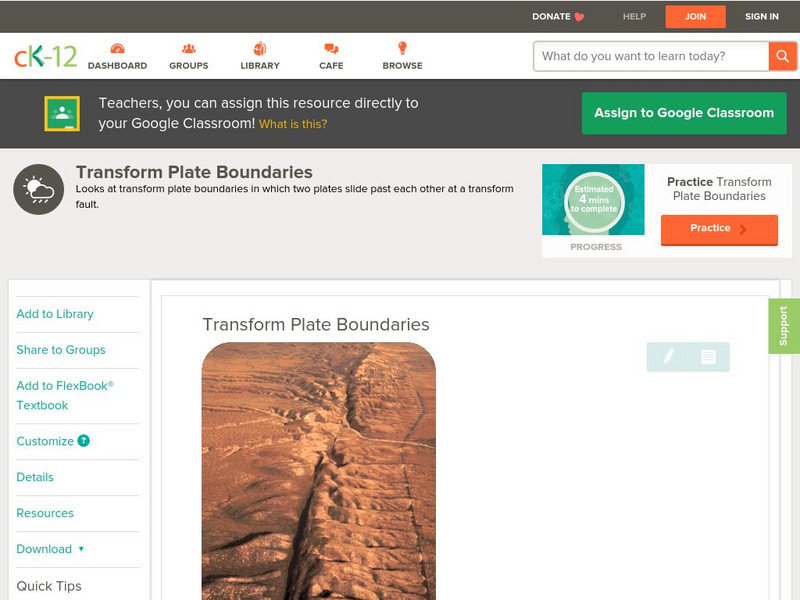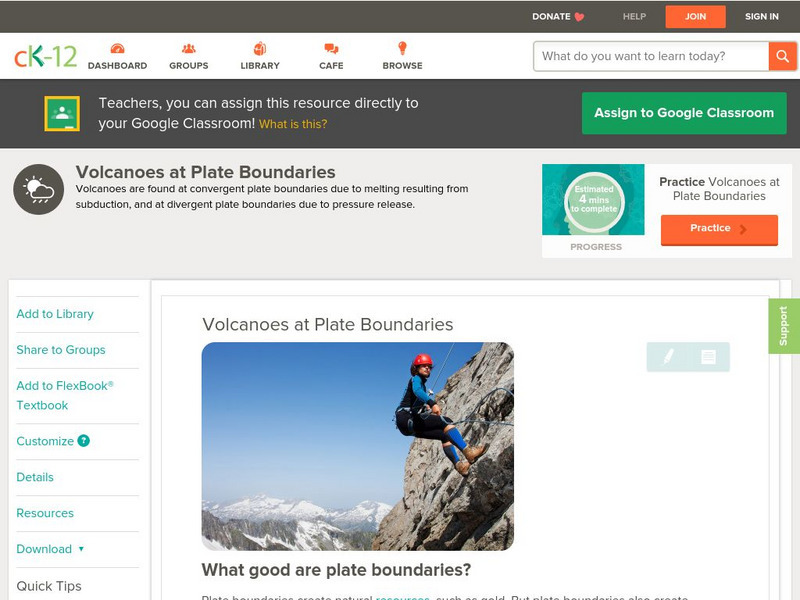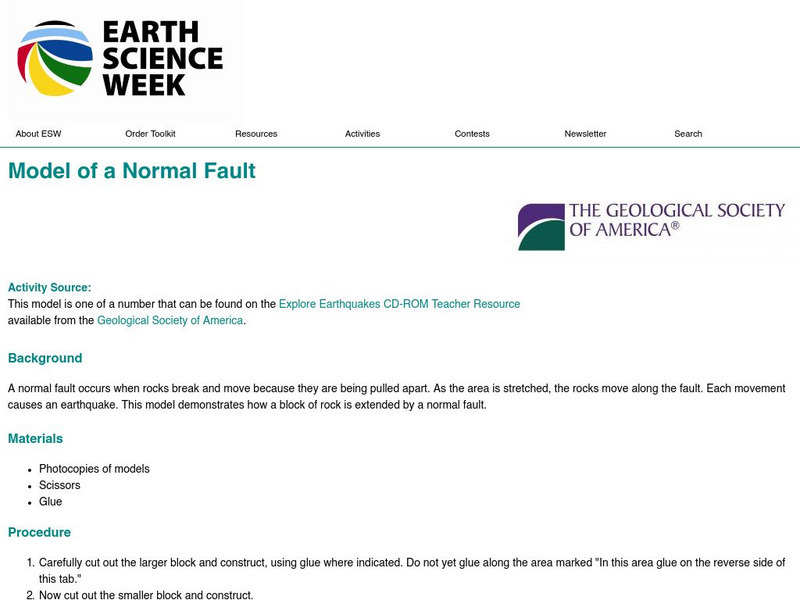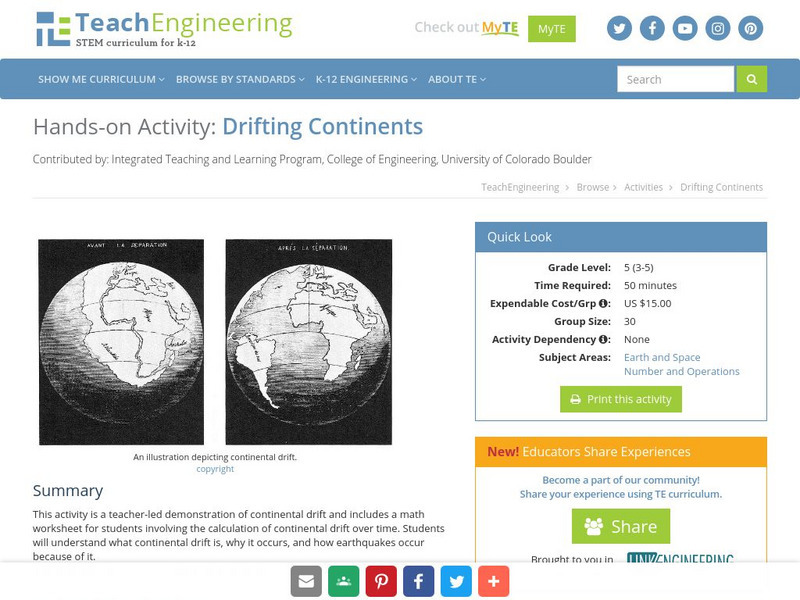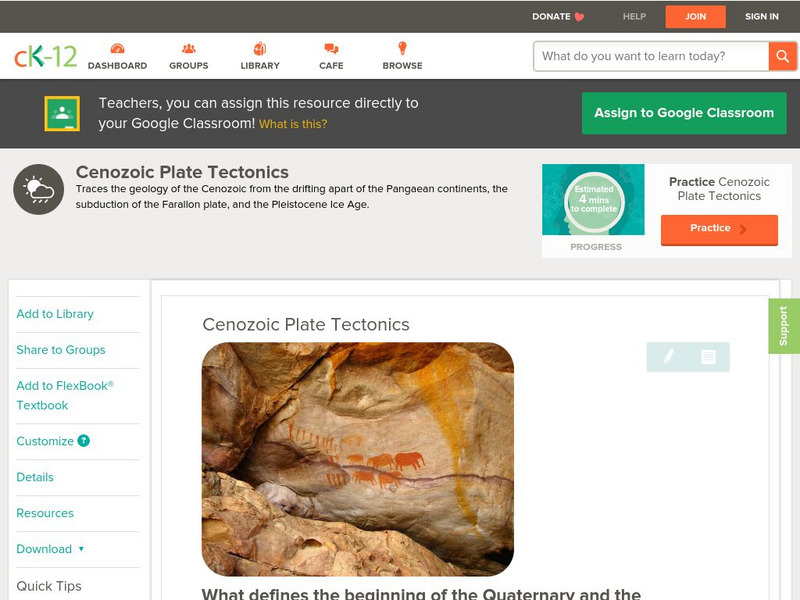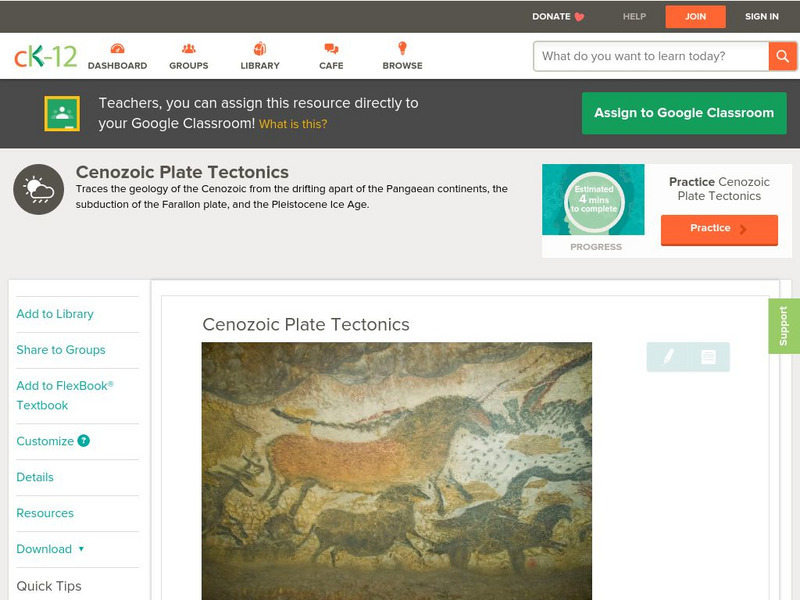Pennsylvania State University
Penn State: Still More Plate Tectonics, the Great Smoky Mountains
The Great Smoky Mountain National Park of North Carolina and Tennessee includes 16 mountains over 6,000 feet (about 2,000 m) high, making this generally the highest region in North America east of the Mississippi River. Gatlinburg is a...
E-learning for Kids
E Learning for Kids: Madagascar: What Are Tectonic Plates and How Are They Moving?
This lesson teaches students about tectonic plates, plate boundaries, and their role in earthquakes and volcanoes.
E-learning for Kids
E Learning for Kids: Science: Seychelles: Earthquakes and Effects
Students learn about what happens inside the Earth to cause an earthquake, how earthquakes are measured, their impact on the surface, and safety precautions to take during an earthquake.
Smithsonian Institution
National Air and Space Museum: Exploring the Planets: Earth's Lithosphere
The plate tectonics and other features of the Earth's lithosphere are explained and illustrated. Has links to definitions of the magnetosphere, atmosphere, and hydrosphere.
Australian Museum
Australian Museum: Plate Tectonic Processes
A comprehensive site on plate tectonics and the Earth. Read how the oceanic and continental crusts, as well as the heat and the pressure within the Earth affect plate tectonics.
National Association of Geoscience Teachers
Nagt: Bringing the Geologic Time Scale Down to Earth in the Students' Backyard
This activity is specifically designed for a field trip to Drayton Hall, which is a historic plantation near Charleston, South Carolina. It does provide a model of how a similar activity could be designed for a local area, and there are...
National Association of Geoscience Teachers
Nagt: Geology Map Observations
In jigsaw groups, young scholars construct the Earth's tectonic plates using geologic maps. Skills such as careful observation, presentation, and synthesis are used to create a map that shows the type and location the plates.
Science Education Resource Center at Carleton College
Serc: Interpreting the Geologic History of Canyon De Chelly
Earth Science teachers will combine field observations with the information given in the classroom to interpret the geologic history of Canyon de Chelly, Arizona.
Science Education Resource Center at Carleton College
Serc: Plotting Earthquakes With Near Real Time Data
This lesson teaches the concept of plate tectonics. Young scholars will access the United States Geological Survey National Earthquake Information Center and plot the longitude latitude and depth of earthquakes on a physiographic chart.
Georgia Department of Education
Ga Virtual Learning: Plate Tectonics
In this interactive tutorial you will learn about the theory of continental drift and why it was ultimately rejected. Then learn about the theory of plate tectonics and the evidence to support it. Lastly discover the types of boundaries...
CK-12 Foundation
Ck 12: Earth Science: Theory of Plate Tectonics
[Free Registration/Login may be required to access all resource tools.] The history of plate tectonics past and future.
CK-12 Foundation
Ck 12: Earth Science: Transform Plate Boundaries
[Free Registration/Login may be required to access all resource tools.] Covers transform plate boundaries on land and in the ocean.
CK-12 Foundation
Ck 12: Earth Science: Transform Plate Boundaries
[Free Registration/Login may be required to access all resource tools.] Covers transform plate boundaries on land and in the ocean.
CK-12 Foundation
Ck 12: Earth Science: Volcano Characteristics
[Free Registration/Login may be required to access all resource tools.] What volcanoes are and where they are located.
CK-12 Foundation
Ck 12: Earth Science: Volcanoes at Plate Boundaries
[Free Registration/Login may be required to access all resource tools.] Volcanoes most often occur at plate boundaries.
American Geosciences Institute
American Geosciences Institute: Earth Science Week: Geologic Maps & Earthquakes
This activity is designed to give students practice using a geologic map to assess the likelihood and location of a particular natural hazard- earthquakes- in California.
American Geosciences Institute
American Geosciences Institute: Earth Science Week: Model of a Normal Fault
Students construct a model that demonstrates how a block of rock is extended by a normal fault.
American Geosciences Institute
American Geosciences Institute: Earth Science Week: Ring of Fire
Students identify plate boundaries as well as continents, countries, and bodies of water to become familiar with an area known as the "Ring of Fire."
CPALMS
Florida State University Cpalms: Florida Students: Mantle Convection and Earth's Features
A resource to help understand that the movement of the Earth's tectonic plates is caused by convection. The plates' movements cause geologic features on the Earth's surface.
Famous Scientists
Famous Scientists: Alfred Wegener
Find out about the life and work of Alfred Wegener, known for his achievements in meteorology and as a pioneer of polar research, and is most remembered as the originator of the theory of continental drift.
TeachEngineering
Teach Engineering: Drifting Continents
This activity is a teacher-led demonstration of continental drift and includes a math worksheet for students involving the calculation of continental drift over time. Students will understand what continental drift is, why it occurs, and...
TeachEngineering
Teach Engineering: Faulty Movement
In this activity, students are introduced to faults. They will learn about different kinds of faults and understand their relationship to earthquakes. The students will build cardboard models of the three different types of faults as...
CK-12 Foundation
Ck 12: Earth Science: Cenozoic Plate Tectonics
[Free Registration/Login may be required to access all resource tools.] How in the most recent age, Pangaea broke apart and made modern plate tectonics.
CK-12 Foundation
Ck 12: Earth Science: Cenozoic Plate Tectonics
[Free Registration/Login may be required to access all resource tools.] How in the most recent age, Pangaea broke apart and made modern plate tectonics.




